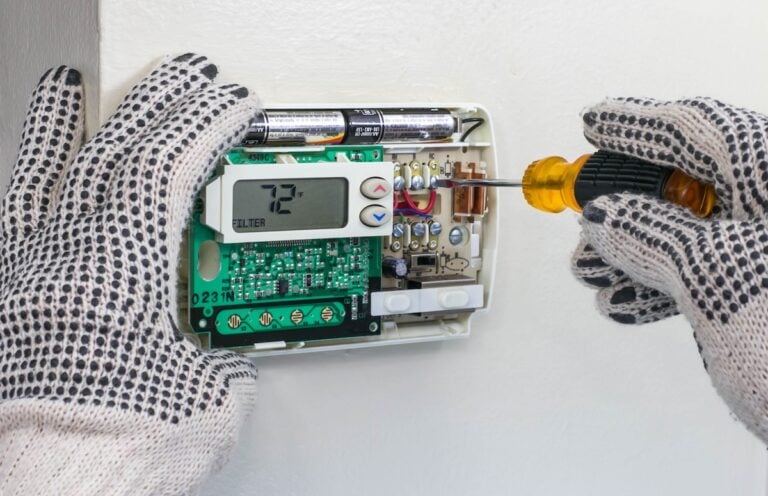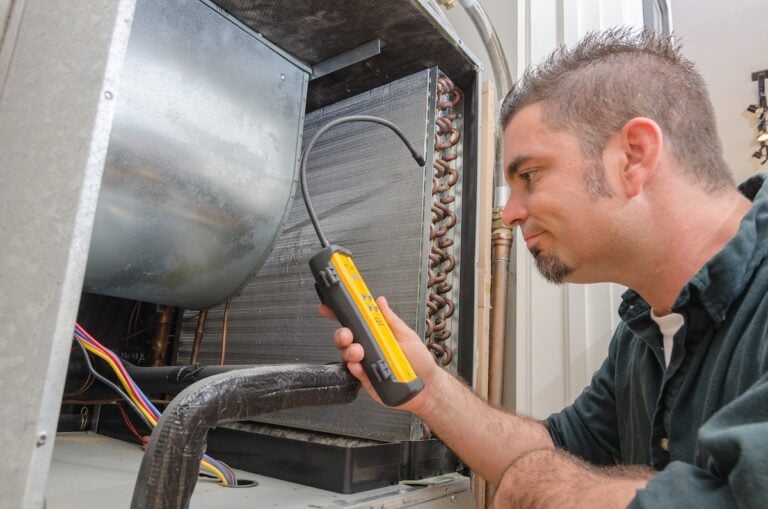
When choosing the best HVAC system for your home, split systems often top the list for their efficiency and versatility. But what exactly is a split system HVAC, and how does it work? This guide unpacks everything you need to know about split systems, their components, benefits, and why they’re an excellent choice for many homes. What this guide covers:
- What is a Split System HVAC?
- Benefits of Split System HVACs
- Choosing the Right Split System for Your Space
🤔 What is a Split System HVAC?

A split system HVAC is one of the most common heating and cooling systems found in homes. True to its name, it is “split” into two main components. The indoor unit includes the air handler and evaporator coil, which are responsible for distributing cool or warm air inside.
The outdoor unit contains the compressor and condenser, which regulate and release heat outside. Split systems provide both heating and cooling, making them an excellent year-round solution for home comfort.
How Does a Split System Work?
Split system HVACs operate based on a heat exchange process. Here’s a step-by-step breakdown:
- Cooling Mode: In summer, warm air is drawn from your home and passed through the evaporator coil. The refrigerant absorbs the heat and releases it outside via the outdoor unit, while cooled air circulates back inside.
- Heating Mode: Modern split systems with heat pumps reverse the cooling process in winter, drawing heat from outside air and pumping it into your home for consistent warmth.
✅ 6 Benefits of Split System HVACs

Here’s why so many homeowners prefer split systems:
1. Cost-Effective Operation
Split systems are known for their energy efficiency, making them a cost-effective solution for heating and cooling your home. They use advanced technology to reduce energy consumption, which translates into significant savings on electricity bills when compared to older, less efficient HVAC systems. Additionally, split systems offer zoning capabilities, allowing you to control the temperature in individual rooms. This means you only use energy where it’s needed, avoiding waste and further reducing unnecessary energy use, making it both economical and eco-friendly.
2. Flexibility and Space-Saving Design
Split systems offer great flexibility thanks to their separated indoor and outdoor units, making them ideal for homes with limited space or unique layouts. The sleek indoor units are designed to fit seamlessly into any room, whether mounted on walls, ceilings, or floors. Because they don’t require extensive ductwork installations, split systems save valuable space and avoid disrupting the existing structure of your home. They are particularly suitable for apartments, small homes, or any property where space optimization is a priority.
3. Quiet Operation
No one wants a noisy HVAC system disrupting the peace and quiet of their home. Split systems are designed with noise reduction in mind, with the loudest components housed in the outdoor unit. This ensures that indoor spaces remain tranquil, creating a more comfortable and peaceful environment. Whether you’re working, relaxing, or sleeping, you’ll barely notice the operation of your split system, making it a great choice for those who value quiet living.
4. Customized Comfort with Zoning
One of the standout features of split systems is their ability to provide customized comfort through zoning. Unlike traditional HVAC systems, which cool or heat the entire house uniformly, split systems allow you to set different temperatures in different rooms or zones. This is especially beneficial for households where family members have varying comfort preferences. For example, you can keep the living room cool while maintaining a warmer temperature in the bedrooms, ensuring everyone is comfortable and happy.
5. Easy Installation
Installing a split system HVAC is far less invasive compared to ducted systems, making it an attractive option for many homeowners. Since these systems don’t rely on extensive ductwork, the installation is quicker, simpler, and more affordable. In most cases, the entire process can be completed within a single day. This makes split systems an ideal solution for retrofitting older homes, upgrading existing heating and cooling systems, or adding climate control to new areas without the need for major renovations.
6. Improved Air Quality
Split systems don’t just regulate the temperature—they also enhance indoor air quality. Equipped with advanced air filters, these systems help remove allergens, dust, bacteria, and other air pollutants from your indoor environment. This creates a healthier living space, particularly for households with individuals who suffer from allergies or respiratory conditions. By circulating clean, filtered air, split systems ensure your family breathes easier and stays healthier, all while keeping your home comfortable year-round.
👉 Choosing the Right Split System for Your Space

Not all split systems are created equal. Choosing the right system depends on a variety of factors:
Room Size
The size of the room plays a crucial role in determining the right air conditioning unit. Larger rooms require more powerful systems to maintain consistent temperatures throughout the space. Choosing an underpowered unit can lead to uneven cooling or heating, while an overpowered unit may waste energy and increase costs. Be sure to measure the room accurately and consider factors like ceiling height and insulation, as these can impact the system’s efficiency.
Energy Efficiency
Energy efficiency is key when selecting a system, as it directly affects your long-term running costs. Look for units with a high SEER (Seasonal Energy Efficiency Ratio) rating, which indicates better energy savings and reduced environmental impact. Higher efficiency systems may cost more upfront but can significantly lower your energy bills over time. Consider this an investment in both your comfort and your wallet.
Features
Modern air conditioning systems come with a variety of features designed to enhance comfort and usability. Look for options like smart connectivity, which allows you to control the unit via your phone or smart home system. Zoning capabilities are perfect for larger homes, letting you adjust temperatures for specific areas. Advanced filtration systems not only improve air quality but can also help reduce allergens, making these features essential for health-conscious buyers.
Climate
Your local climate is another critical factor to consider, especially if you’re choosing a system with a heat pump. Heat pumps in split systems can perform differently depending on the temperature range in your region. Some systems are designed to handle extreme cold or heat more efficiently, so it’s important to select one suited to your specific climate conditions. Be sure to research models that perform well in your area to ensure year-round comfort.
🏠 Split System HVAC
At Thelen Plumbing, Heating, and Air, we understand how important a reliable split system HVAC is for your home’s comfort. With our unmatched expertise, customer-focused solutions, and commitment to affordability, you can trust us to handle all your HVAC needs with care and precision.
Plus, with 24/7 emergency services, we’re always here when you need us most. Ready to upgrade your home’s heating and cooling system? Contact us today to schedule a consultation and experience the Thelen difference!
Unlock Our Limited-Time Deals!
Take advantage of our offers on AC tune-ups, new installs, repairs, and more.
We Can’t Wait to Help Your Home!
"*" indicates required fields





